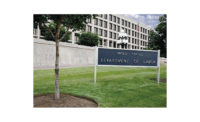Federal Agencies Release 'Blacklisting' Regulation
Construction contractor groups blast rule but organized labor praises it
Federal agencies have released a final rule and a guidance document that require firms bidding on federal projects to disclose more information about their track record in complying with workplace safety, labor and civil rights laws before they can win a federal contract.
The regulation and guidance, released on Aug. 24, implement a July 2014 presidential executive order that aims to increase efficiency and cost savings in federal contract procurement. The Labor Dept. issued the guidance and the Federal Acquisition Council issued the regulation.
Labor Secretary Tom Perez said in a statement that the rule is meant to ensure that firms that “cut corners” in complying with workplace laws do not “benefit from taxpayer-funded” federal contracts.
But critics, which include construction industry groups such as the Associated Builders and Contractors and Associated General Contractors of America, say that the regulation would allow unelected federal officials to "blacklist" firms that run afoul of guidelines that they contend are vague.
Although contractors are already required to disclose findings of fault and liability made in administrative or civil proceedings, the White House says that current disclosure requirements do not give a full picture of firms’ compliance with basic workplace protections. Under the rule, prospective contractors will be required to disclose violations of 14 workplace protections.
But ithe Federal Acquisition Regulatory Council said that the regulation and the guidance contain some changes from the proposals that were issued last year. For example, the final version phases in some of the regulatory mandates. Initially, contractors must report only violations that occurred in the past year. That gradually increases to include violations from the past three years by Oct. 25, 2018.
In addition, for the first six months the rule is in effect (from Oct. 25, 2016, through Apr. 24, 2017) prospective prime contractors will not be required to make disclosures of any labor-law violations. There is an exception to this grace period, however. Firms that bid on federal contracts valued at $50 million or more—and for which bid solicitations are issued during the October-April period—would have to disclose violations.
After next Apr. 24, however, the disclosure requirements will be broadened, applying to contracts valued at $500,000 or more.
Subcontractors' disclosures also are phased in—subs won't have to make the disclosures during the first year the rule is in effect.
Stephen Sandherr, AGC chief executive officer, said in a statement that his group has long fought to ensure that responsible firms do not have to compete against unethical or unscrupulous firms that cut corners. But the Obama administration’s rule gives too much latitude to federal procurement officers, who could discriminate against employers based on personal biases, he said.
One of the biggest flaws of the rule, Sandherr added, is that it allows a federal contracting official to give greater weight to the same safety violations depending on which firm was accused of committing them. “Such subjective criteria opens the door to punishing federal contractors based on which political, social or labor causes they support, instead of their safety performance or treatment of workers," Sandherr said.
Ben Brubeck, ABC vice president of regulatory, labor and state affairs, said that the rule "will create a murky and needlessly subjective procurement process that will result in fewer qualified and responsible contractors bidding for federal contracts."
AFL-CIO President Richard Trumka hailed the new regulation. He said in a statement, "This measure will make our contracting system more fair and accountable, which is good for working families, law-abiding employers, and communities."
Lisa Gilbert, director of Public Citizen’s Congress Watch division, praised the administration for prohibiting federal contractors with contracts of more than $1 million from requiring employees to privately arbitrate civil rights or sexual harassment and assault claims.
The rule goes into effect on Oct. 25.




